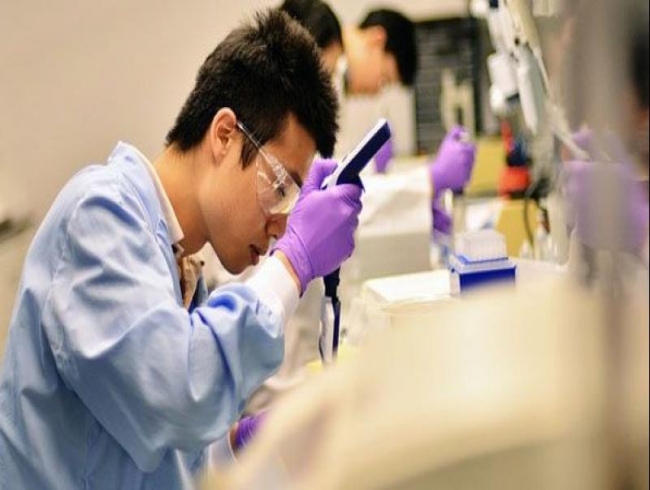US to establish lab network for combating 'superbugs'
Posted June 1st, 2016, 11:07 AM IST

The announcement by the US Centers for Disease Control and Prevention came as authorities try to identify people who had contact with a 49-year-old woman in the eastern state of Pennsylvania whose urinary tract infection tested positive for E coli bacteria carrying the antibiotic-resistant mcr-1 gene.
Starting in the fall, the CDC will provide infrastructure and lab capacity for "seven to eight regional labs, and labs in all states and seven major cities/territories, to detect and respond to resistant organisms recovered from human samples," the agency said in a statement.
State labs will be able to detect changes in antibiotic resistance and report the findings to federal authorities, leading to faster and more effective investigations and "stronger infection control among patients to prevent and combat future resistance threats."
The Pennsylvania woman had not traveled abroad recently and officials do not know how she contracted the bacteria with the antibiotic-resistant gene previously found in China and Europe.
The mcr-1 gene makes bacteria resistant to the drug colistin, which is used as an antibiotic of last resort. Colistin has been available since 1959 to treat infections but was abandoned for human use in the 1980s due to high kidney toxicity. It is widely used in livestock farming, especially in China.
However, colistin has been brought back as a treatment of last resort in hospitals and clinics as bacteria have started developing resistance to other, more modern drugs. The CDC said an investigation has determined that the Pennsylvania patient did not have a type of bacteria known as carbapenem-resistant enterobacteriaceae (CRE) and it was not resistant to all antibiotics.
"The presence of the mcr-1 gene, however, and its ability to share its colistin resistance with other bacteria such as CRE raise the risk that pan-resistant bacteria could develop," the CDC said. US health authorities have been looking for the mcr-1 gene in the US since it emerged in China in 2015.
Its discovery in the United States for the first time "heralds the emergence of truly pan-drug resistant bacteria," said a Defense Department report on the finding published last week in Antimicrobial Agents and Chemotherapy, a journal of the American Society for Microbiology.
The Defense Department is among several agencies working to identify people who came in contact with the Pennsylvania woman. "We risk being in a post-antibiotic world," CDC chief Thomas Frieden said in announcing the discovery of the mcr-1 gene in the United States.
The patient herself is doing "fine," the Tribune-Review newspaper in Pennsylvania reported, citing CDC official Beth Bell. At least 30 percent of antibiotics prescribed in the United States are unnecessary, according to a study published this month by the Journal of the American Medical Association.
Each year, at least two million people in the United States are infected with antibiotic-resistant bacteria, and at least 23,000 die as a direct result of the infections, according to CDC data. The Department of Defense noted on its official science blog that so far, the mcr-1 gene appears to be rare, with no cases found among more than 53,000 bacteria samples.
However, authorities say consumers should protect themselves from potential infection by properly cooking all meat to kill foodborne germs.
- Kukatpally, Old City and Tolichowki made their mark as the city's top street food hubs
- Political leaders attend grand Alia Balai programme in Hyderabad
- Over 7,500 daily steps before surgery tied to fewer complications
- Deepika talks mental health with corporate bosses
- Sweet Shop - Owners of Calcutta and Other Ideas: Taste the universe
- Life in motion
- Witness The Most Riveting Courtroom Drama of The Year
- Mind-Body Synergy: Embracing Profound Connection Between Mental and Physical Health
- Red Haute Alert
- WWF-India Hosts Second Earth Series Talk: "A Tale of Two Cats"
- Hyderabad entrepreneurs ‘Modify’ clothes from aloe vera to orange peel
- How to Apply Onion Juice to Hair
- Patriotism is in thing, it’s Tricolour everywhere
- Celebs too wear fakes of reputed brands
- Elon Musk on fun trail says 'buying Coca Cola next'
More Lifestyle News
- Vijay Sethupathi’s heartwarming selfie with elderly voter goes viral
- ‘aha’ unveils promo for ‘Sarkaar Season 4’ featuring Sudigali Sudheer as host
- Record rains in UAE flood Dubai International Airport, disrupt travels
- Akshay Kumar joins Vishnu Manchu’s ‘Kannappa’ shoot in Hyderabad
- Suhana Khan shares joyful photos with Ananya Panday after KKR victory
- Kartik Aaryan says he’s ready for love, asks Neha Dhupia to find someone for him
- Indian film stars extend Ugadi, Gudi Padwa, and Navreh wishes
- Mrunal Thakur honored for ‘Hi Nanna’ performance, details inside
- Prithviraj-starrer ‘The Goat Life’ rakes it in: Rs 100 cr in 9 days
- Rashmika Mandanna’s ‘Srivalli’ takes center stage in Pushpa 2: The Rule poster drop
A PHP Error was encountered
Severity: Warning
Message: file_get_contents(): http:// wrapper is disabled in the server configuration by allow_url_fopen=0
Filename: views/newsdetails.php
Line Number: 29
Backtrace:
File: /home5/am2pm/public_html/application/views/newsdetails.php
Line: 29
Function: file_get_contents
File: /home5/am2pm/public_html/application/controllers/News.php
Line: 135
Function: view
File: /home5/am2pm/public_html/application/controllers/News.php
Line: 83
Function: newsdetails
File: /home5/am2pm/public_html/index.php
Line: 315
Function: require_once
A PHP Error was encountered
Severity: Warning
Message: file_get_contents(http://www.indiaaffiliates.in/ads.php?size=300X250): failed to open stream: no suitable wrapper could be found
Filename: views/newsdetails.php
Line Number: 29
Backtrace:
File: /home5/am2pm/public_html/application/views/newsdetails.php
Line: 29
Function: file_get_contents
File: /home5/am2pm/public_html/application/controllers/News.php
Line: 135
Function: view
File: /home5/am2pm/public_html/application/controllers/News.php
Line: 83
Function: newsdetails
File: /home5/am2pm/public_html/index.php
Line: 315
Function: require_once














